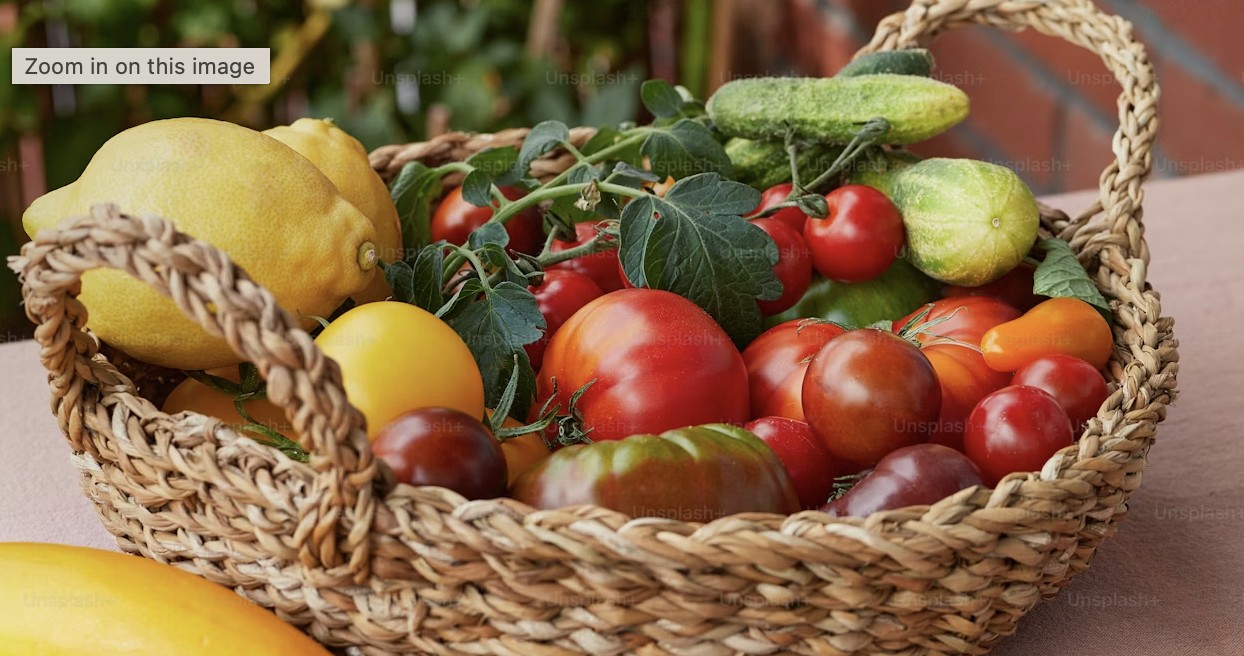
- Balance food and calorie intake with physical activity to maintain a healthy weight. Individuals need varying amounts of energy (calories) based on age, activity level, sex, and size. A healthy dietary pattern coupled with an appropriate energy amount and at least 150 minutes of moderate physical activity per week can help maintain a healthy body weight.
- Choose a wide variety and eat plenty of fruits and vegetables to get a full range of nutrients from food rather than supplements. Eating many fruits and vegetables, in a variety of colors, contributes positively to health. Consuming whole fruits and vegetables provide more fiber and satiety than juices or supplements.
- Choose whole grains and other foods made up mostly of whole grains. Regular consumption of whole grains is linked to favorable cardiovascular health. Whole grain products contain all parts of the kernel, including the bran and germ which are usually removed in refined flours. Products can be labeled as whole grain if they contain at least 51% whole grain flour. Look for 100% whole grain for even more benefits!
- Include healthy sources of lean and/or high-fiber protein such as plant proteins (nuts and legumes), fish or seafood, low fat or nonfat dairy, lean cuts of meat and limit red and processed meats. The AHA recommends getting most of your protein from plant sources (legumes and nuts). Soy, lentils, chickpeas, and split peas are common legumes that are rich in protein and are high in fiber. The AHA also recognizes fish, seafood, and lean animal proteins as good choices. If choosing a commercial meat-substitute, be mindful of the label. Many of these commercial substitutes are ultra-processed and contain added sugar, saturated fat, salt, stabilizers, and preservatives.
- Use liquid non-tropical plant oils such as olive or sunflower oils. Studies have shown that replacing saturated or trans fats with polyunsaturated or monounsaturated fats has cardioprotective effects. Plant oils such as soy, corn, safflower, walnut, and sunflower as well as flax seeds are good sources of polyunsaturated fats. Canola and olive oils are good sources of monounsaturated fat. Saturated and trans fats are found in animal, dairy, and partially hydrogenated fats.
- Choose minimally processed foods rather than ultra-processed foods as much as possible. While there are not yet official definitions of processed foods, the AHA uses the definitions provided by NOVA classifications. They define minimally processed (or unprocessed) foods as edible parts of plants and animals and ultra-processed foods as foods that go beyond the incorporation of salt, sweeteners, or fat to include artificial colors and flavors and preservatives that promote shelf stability, preserve texture, and increase palatability. Consuming many ultra-processed foods is of concern because of their association with adverse health outcomes, such as overweight and obesity, type 2 diabetes, and cardiovascular disease.
- Minimize intake of beverages and foods with added sugars. Added sugars refer to any sugars added to a food or beverage during preparation or processing. Added sugars have consistently been associated with elevated risk of type 2 diabetes, congenital heart defects, and excess body weight. Research is still being done to determine the effects of sugar substitutes.
- Choose or prepare foods with little or no salt. This one takes some work because salt is a very common additive, but there is a correlation between salt intake and blood pressure. Consuming higher levels of salt generally leads to higher blood pressure. In the United States, the leading sources of salt are processed foods, foods prepared outside the home, packaged foods, and restaurant foods, together accounting for almost three-quarters of total dietary sodium. Look for low or no salt added foods and know it may take some getting used to. Fortunately, slowly decreasing your salt intake can help your taste buds adjust to the change. (See my blog post on Ways to Cut Back on Sodium).
- Limit alcohol consumption; if you don’t drink, do not start. Alcohol consumption and cardiovascular risk is complex; it is dependent on many factors such as age, health, amount consumed. There is limited evidence that small amounts of alcohol may have some beneficial heart health effects, but because the net health effects are unsure, the AHA does not recommend consuming alcohol.
- Apply this guidance no matter where food is prepared or consumed. These recommendations continue wherever you are eating and drinking. Nutrition rules do not end at your doorstep and with many people eating meals outside the home, it is important to try and follow a healthful dietary pattern wherever you are.
Interested in more clarification on these guidelines? Schedule a consultation with Jordan to get started building your own healthy dietary pattern! 785-560-2566 or rdn@manhattannutritionclinic.com.
The full article can be found in the American Heart Association’s magazine, Circulation.
Lichtenstein AH, Appel LJ, Vadiveloo M, Hu FB, Kris-Etherton PM, Rebholz CM, Sacks FM, Thorndike AN, Van Horn L, Wylie-Rosett J; on behalf of the American Heart Association Council on Lifestyle and Cardiometabolic Health; Council on Arteriosclerosis, Thrombosis and Vascular Biology; Council on Cardiovascular Radiology and Intervention; Council on Clinical Cardiology; and Stroke Council. 2021 Dietary guidance to improve cardiovascular health: a scientific statement from the American Heart Association. Circulation. 2021;144:e•••–e•••. doi: 10.1161/CIR.0000000000001031












